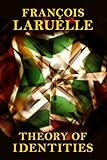Theory of Identities.
Material type: TextPublisher: New York, NY : Columbia University Press, [2016]Copyright date: ©2016Description: 1 online resource (296 p.)Content type:
TextPublisher: New York, NY : Columbia University Press, [2016]Copyright date: ©2016Description: 1 online resource (296 p.)Content type: - 9780231168946
- 9780231541459
- 111.82 23
- B77 .L3713 2016
- B77 .L3713 2017
- online - DeGruyter
- Issued also in print.
| Item type | Current library | Call number | URL | Status | Notes | Barcode | |
|---|---|---|---|---|---|---|---|
 eBook
eBook
|
Biblioteca "Angelicum" Pont. Univ. S.Tommaso d'Aquino Nuvola online | online - DeGruyter (Browse shelf(Opens below)) | Online access | Not for loan (Accesso limitato) | Accesso per gli utenti autorizzati / Access for authorized users | (dgr)9780231541459 |
Browsing Biblioteca "Angelicum" Pont. Univ. S.Tommaso d'Aquino shelves, Shelving location: Nuvola online Close shelf browser (Hides shelf browser)

|

|

|

|

|

|

|
||
| online - DeGruyter On the Difficulty of Living Together : Memory, Politics, and History / | online - DeGruyter Taste as Experience : The Philosophy and Aesthetics of Food / | online - DeGruyter The Power of a Single Number : A Political History of GDP / | online - DeGruyter Theory of Identities. | online - DeGruyter Political Responsibility : Responding to Predicaments of Power / | online - DeGruyter Karl Polanyi : A Life on the Left / | online - DeGruyter Jews and the American Religious Landscape / |
Frontmatter -- Contents -- Preface to the English Edition: Retrospection (2014) -- Preface to the French Edition (1992) -- Introduction: Science, Identity, Fractality -- Part I. The Essence of Science -- 1. Science: A Nonepistemological Description -- 2. Non-philosophy: A Scientific Reform of the Understanding -- Part II. Theory of Generalized Fractality -- 3. Of Determination-in-the-Last-Instance as Destruction of the Principle of Sufficient Determination -- 4. The Concepts of Generalized Fractality and Chaos -- Part III. Principles of an Artificial Philosophy -- 5. Unified Theory of Thought -- 6. The Concept of an Artificial Philosophy -- 7. The Fractal Modeling of Philosophy -- Notes -- Index
restricted access online access with authorization star
http://purl.org/coar/access_right/c_16ec
François Laruelle proposes a theory of identity rooted in scientific notions of symmetry and chaos, emancipating thought from the philosophical paradigm of Being and reconnecting it with the real world. Unlike most contemporary philosophers, Laruelle does not believe language, history, and the world shape identity but that identity determines our relation to these phenomena. Both critical and constructivist, Theory of Identities finds fault with contemporary philosophy's reductive relation to science and its attachment to notions of singularity, difference, and multiplicity, which extends this crude approach. Laruelle's new theory of science, its objects, and philosophy, introduces an original vocabulary to elaborate the concepts of determination, fractality, and artificial philosophy, among other ideas, grounded in an understanding of the renewal of identity. Laruelle's work repairs the rift between philosophical and scientific inquiry and rehabilitates the concept of identity that continental philosophers have widely criticized. His argument positions him clearly against Deleuze, Badiou, the new materialists, and other thinkers who stray too far from empirical approaches that might revitalize philosophy's practical applications.
Issued also in print.
Mode of access: Internet via World Wide Web.
In English.
Description based on online resource; title from PDF title page (publisher's Web site, viewed 02. Mrz 2022)


